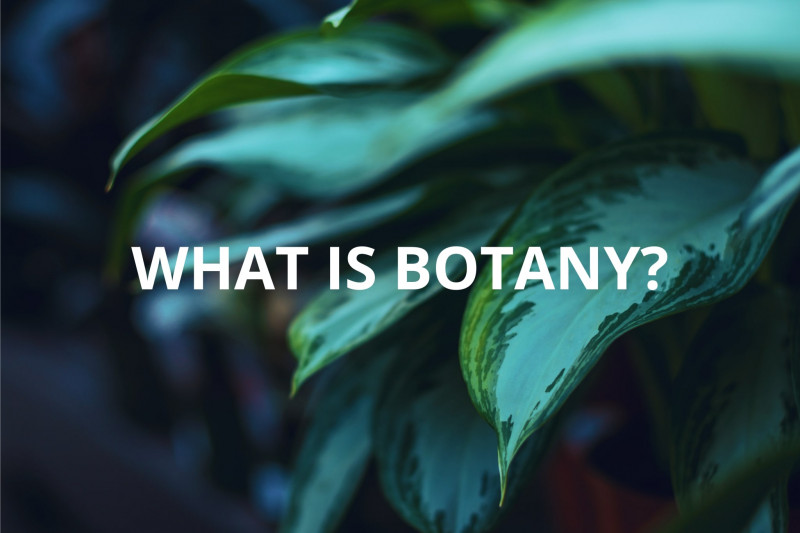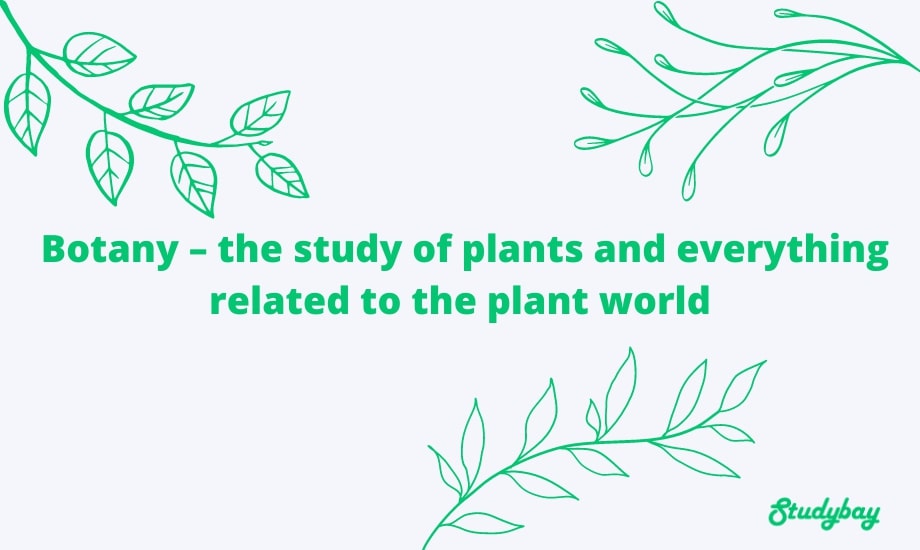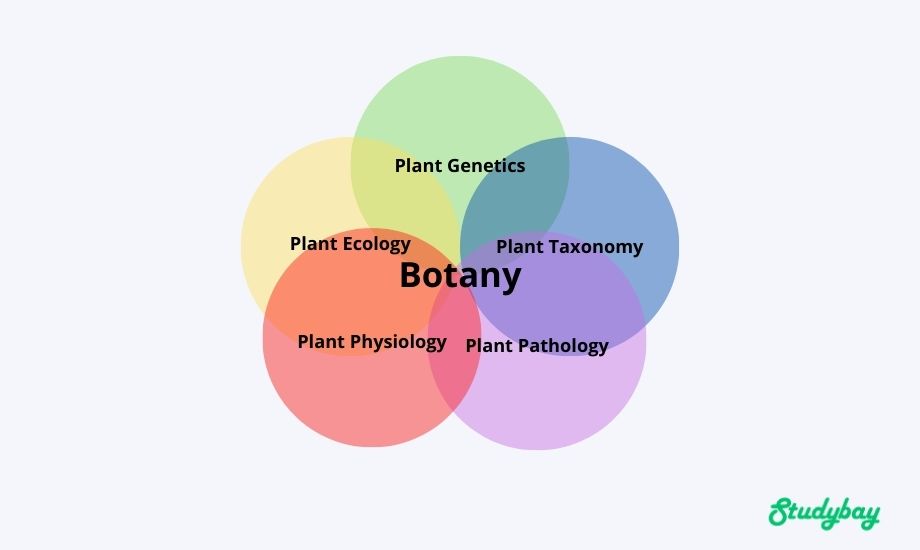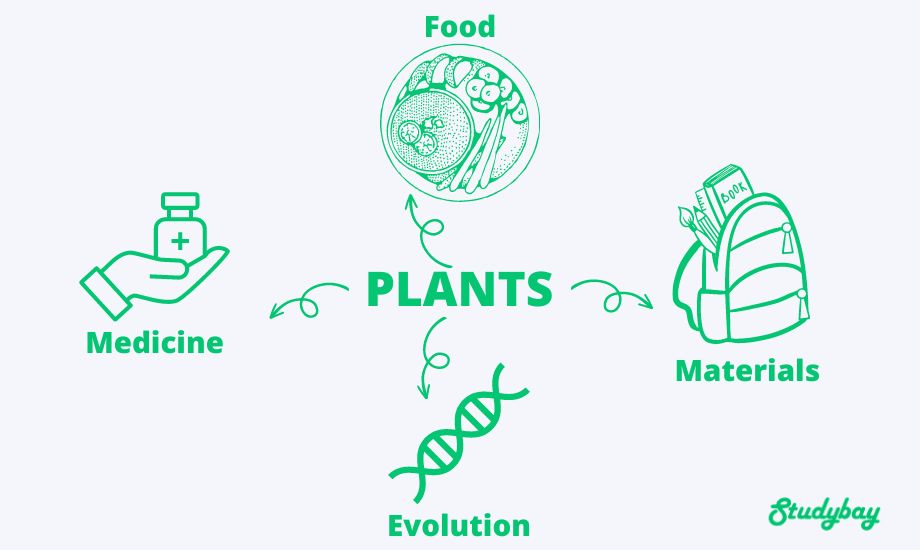
23 min
5
08.03.2023

Knowledge about plants is one of the oldest systems of knowledge of mankind. It includes the accumulation of empirical knowledge about plants and their properties so people know which plants are edible, which are medicinal, and which are poisonous. Since then, botany has advanced much further and now includes several disciplines, from the study of the chemical composition of cells to the selection and creation of new plant species. When you are just starting to study biology, you may not know much about botany. If you are asking, “what does botany mean” read on to learn more about what the science of botany includes with Studybay!
Botany Definition

What is Botany in Science?
Scientists define botany as the science of plants that studies all the features of plant organisms: plant life, plant structure, properties, reproduction, diversity, and even plant diseases. This branch of biology is a life science that focuses mainly on plants. And what type of science is botany? It is a natural science, similar to physics and chemistry, which deals with matter, energy, and their interrelations and transformations or with objectively measurable characteristics.
Now you know the essence. But what does the word botany mean? The word came from the adjective botanic, the root word of which was the Ancient Greek term “botane.” It referred to plants, herbs, and pastures. Botany also has more narrow meanings; for example, it may refer to the biology of a certain type of plant (the botany of flowering plants) or to the plants of a specific area (the botany of a tropical forest). A person who studies plant science is called a botanist.
History of Botany
So, what science is botany, and who created it? The history of botany development is linked to Aristotle. This ancient Greek scientist began to take a closer look at the surrounding nature. One of Aristotle’s most significant works is “The Theory of Plants,” in which he made an attempt to describe and explain their living and inanimate nature from a philosophical point of view.
The works of Theophrastus, one of Aristotle’s students, made a huge contribution to botany as a science. His most famous treatises are “The History of Plants” and “The Causes of Plants,” which describe the plants of the Mediterranean Region. Theophrastus also created a plant classification in which he divided the plants into trees, grasses, and shrubs.
The turning point in the history of plant science was at the end of the XV century, in the era of great geographical discoveries. New plant species were imported from different countries, and there was a need for their description and naming. In the middle of the XVI century, the first botanical gardens appeared in Italy and Switzerland. During this period, the foundations of botanical terminology were laid.
Scientists tried to answer the question, “what kind of science is botany.” They concluded that it is more natural than technical science because it deals with evaluation and transformation rather than calculations. The systematics and descriptive morphology of the XVIII century reached their peak in the works of the Swedish botanist Carl Linnaeus. The systematization of the plant world is closely related to the use of the comparative descriptive method – plants were described and compared with each other by external (morphological) signs. In 1735, Linnaeus published the book “The System of Nature,” in which he classified plants according to the structure of the organ of reproduction.
In the XIX century, the meaning of botany was significant. Such sections as physiology, geography, and ecology of plants, paleobotany, and embryology emerged. In 1838, the German botanist M. Schleiden established that a cell is a universal structural unit in the body of plants.
A new breakthrough in the development of this science, as well as in biology as a whole, occurred in the XX century. One of its reasons was scientific and technological progress, which stimulated the emergence of new research methods and tools. Science continues its development to this day, as we still don’t know all about botany.
Types of Botany

As we mentioned above, botany is a study of plant life on our planet. Since the meaning of botany in science is clear, let’s uncover more information about botany types. This field of science includes several branches:
- Plant Physiology. It is also known as plant anatomy – the study of the tissue and cellular structure of plant organs. As a rule, the term “anatomy” applied to plants refers to structures that are observed under a powerful light or electron microscope.
- Plant Ecology. Ecology studies the interactions of living organisms with each other and with their habitats. Plant ecology deals with plant populations, interactions between different plant organisms, and their distribution across different geographical areas.
- Plant Pathology. This discipline demands thorough botanical research in the field of plant diseases. This is the science of plant illnesses caused by pathogens and environmental factors. It usually includes the development of a means to combat diseases and prevent plant damage.
- Plant Genetics. This type of plant science studies the specifics of plant development and genes that ensure the normal formation and functioning of plants.
- Plant Taxonomy. This is the discipline dealing with the natural classification of plants. Taxonomists find, identify, describe, classify, and name plants.
- Phytocoenology. It studies the vegetation cover of the planet, notes dynamic changes in nature, and the mechanisms and patterns of these changes.
- Paleobotany. This is the study of plant fossils. This branch is closely related to natural sciences such as geology and geography.
This is not a comprehensive list, as there are more examples of botany and various disciplines like biochemistry, physics, microbiology, molecular biology, and plant medicinal uses, which are related to it. Even more importantly, scientific knowledge has yet to be expanded in many of these areas.
Significance of Botany

Now that you can answer “what’s botany,” let’s find out why this science is of great significance. This science is of paramount importance to the whole planet because, thanks to the knowledge accumulated in this area, problems with food in densely populated areas of the Earth are being solved. Plants are a source of sustenance. Scientists who study plants in the wild collect information about them and then apply scientific knowledge to agriculture.
Additionally, plants are an important source of biologically active substances (the number of these can reach ten). These substances directly affect the body of humans and animals when they are consumed. That’s why their exploration is useful in medicine, dietetics, nutrition studies, and cosmetology.
This science also helps to understand what evolutionary path plants took in the distant past so that we can learn more about our history. For a long period of time, naturalists have described plants: their size, specifics of organs, and color. These works, along with paleobotany, helped us to find out what the climate was like in ancient times, how plants changed, and which of them survived or died out.
Moreover, fabric and paper, medicines, and some building materials are made from plants. For example, the main material needed in the production of paper materials is cellulose. It is produced mainly from wood, but reed and straw are sometimes also used. We use plants on a daily basis because they are carefully studied and then taken for manufacturing.
Botany Majors
What does botany mean? A full understanding of plant biology is crucial for anyone looking to become a botanist. So, what is the meaning of botany majors, and what can a person study? We would like to explore the most common example of a botany major: Plant Biology Major.
Obviously, you will study botany, the study of plants and their structure, development, and reproduction. Then you may take more specific courses, such as microbiology. In addition, it is usually required that you take courses in other natural sciences, such as chemistry and physics. You can also take part in educational programs in other disciplines, including social studies and public relations, history, geology, geography, or even IT. To start your career successfully, you should gain practical experience during internships, volunteering, on-campus jobs, and seasonal field expeditions.
There are some more bio-related majors that you can enroll in the US:
|
Major |
University |
Tuition and Fees |
|
Biological and Biomedical Sciences |
University of California, Berkeley |
$43,980 (out-of-state) $14,226 (in-state) |
|
Biology/Biological Sciences, General |
University of Michigan--Ann Arbor |
$57,273 (out-of-state) $17,786 (in-state) |
|
Biology |
University of Florida |
$28,658 (out-of-state) $6,380 (in-state) |
|
Biological and Biomedical Sciences |
University of Texas at Austin |
$40,996 (out-of-state) $11,752 (in-state) |
|
Botany/Plant Biology |
University of Wisconsin - Madison |
$39,427 (out-of-state) $10,796 (in-state) |
Source: https://www.usnews.com/best-colleges/botany-major-2603
If you're interested in pursuing a botanical-related degree but are having trouble writing your college application essay, watch this video where one of our experts shares tips on how to write a good one from scratch.
Careers in Botany
Now that you have read a brief description of botany, its significance, and majors in the field, let’s move to where you can work as an educated specialist. Many people are interested in plants, but they may think that there are only a few opportunities. The reality is that they often hear questions like “what is botany about” and “where would you work.” In fact, many jobs related to plants are interdisciplinary or just new, and there is surely a chance to be an in-demand specialist in your country and in many others.
The first thing a future botanist needs is a degree. This could be a bachelor’s degree in the fields of botany, plant science, and plant biology or a master’s degree/Ph.D. The latter opens up a path to get more authority and supervisory roles. As an alternative, you may study general biology and take extra classes on the physiology and classification of plants.
As a botanist, you can work in different places depending on your personal preferences. Some people enjoy working in academic or government laboratories and offices, while others prefer parks, field expeditions, or botanical gardens. There are also many pharmaceutical and biotechnology companies that require experts in this field. Remember that when you are looking for a job, you do not have to write the word “botany,” as this narrows down your choice. Let’s look at some common examples:
- Botanist
- Wetland Biologist
- Biological Technician (Plants)
- Riparian
- Range Technician
- Natural Resource Specialist
- Range Conservationist
- Fire Effects Monitor
- Lab Technician (Technical Assistant)
- Forester
- Wildlife Biologist
- Tutor, Professor (Assistant)
For you to learn more about career perspectives, we gathered data with more popular offers and average salaries. As of January 2023, botanist career prospects in the US are the following:
|
Job |
Salary |
|
Lead Field Botanist |
hourly rate of $26.87 - $28.96 |
|
Assistant Field Botanist |
hourly rate of $22.91 - $24.69 |
|
Technical & Scientific Biologist |
hourly rate of $30 - $32 |
|
Lab Technician |
hourly rate of $12.02 - $18 |
|
Senior Research Technician, Plant Genome Editing and Propagation |
$39,000 - $63,400 per year |
|
Biological Science Technician (Plants) |
$51,425 - $66,852 per year |
|
Conservation Scientists and Foresters |
$43,280 - $98,330 per year |
|
Cellular/Molecular Biologist |
$60,000 - $80,000 per year |
|
Research Scientist / Cellular Biologist |
$84,000 - $126,000 per year |
Source: https://www.monster.com
Let’s step aside and provide some useful information for current college and university students. If you still wonder what botany in biology is or you’re having difficulties doing your homework, you can contact the experts at Studybay, and we will provide high-quality assistance. Our botany homework help service is reliable and trustworthy, so you can expect 100% original work. We have gathered top-notch professionals from different countries and checked their skills and knowledge. Studybay ensures transparency, simple communication, and fast payment processing. We have helped thousands of students to excel in various subjects. If interested, find out more on our webpage!
Recently one of our biology experts shared the following story:
“One student asked me, “Botany is the scientific study of what?” And I answered that he could not ask “botany is the study of what” because it’s the “study of how.” There is no simple answer like “it is the study of plants,” no. Botany is devoted to how plants appear, transform, and grow; the way they give life to everything else with their wonderful ability to produce oxygen; how nature appeared on earth and why it is important for everyone, including people; how to take care of nature and protect plants of all kinds; how to create new varieties of wheat and tomatoes for the benefit of humanity. And much more.”
We hope that this article was useful. If you have any questions about biology homework help, feel free to ask. Our chat is available 24/7, and we are happy to provide all necessary support.
FAQ
What Is the Study of Botany?
Botany is the study of what plants are, how they function, where they grow, how they develop and reproduce, and how they can be applied and modified. Botanists study plant structures, their properties, and the biochemical processes that happen inside and outside of them.
What Is the Definition of Botany?
The definition of botany is quite simple: it is the study of plants and everything related to the plant world, from cells to the interaction between plant species. If you want to ask “what is meant by botany,” just contact Studybay experts, and we will explain any topic you need.
What Is Botany Today?
Science today is much more advanced than it was in the past. The entire twentieth century and the beginning of the twenty-first century were marked by breakthrough technologies that gave new life to such sciences as biochemistry, molecular biology, and genetics. Now there is a space for interdisciplinary research and IT.
References
- “Areas of Specialization in Botany.” (2023). St. Louis: Botanical Society of America. Retrieved 2023-01-29 from https://botany.org/home/careers-jobs/careers-in-botany/areas-of-specialization-in-botany.html
- Botany. (2023). Biology Dictionary. Retrieved 2023-01-29 from https://biologydictionary.net/botany/
- Botany. (2023). Cambridge: Cambridge Dictionary. Retrieved 2023-01-29 from https://dictionary.cambridge.org/dictionary/english/botany
- Botanist Job Search. (2023). Monster Worldwide. Retrieved 2023-01-30 from https://www.monster.com/
- Colleges Offering a Botany Major. (2023). US News Ratings. Retrieved 2023-02-02 from https://www.usnews.com/best-colleges/botany-major-2603
- Harper, Douglas. (2017). “Botanic.” Online Etymology Dictionary. Retrieved 2023-01-29 from http://www.etymonline.com/index.php?term=botanic
- Nigel, Chaffey. (2011). An introduction to plant structure and development. Plant anatomy for the Twenty-First Century, Annals of Botany, Volume 108, Issue 3, Pages vi–vii. Retrieved 2023-01-29 from https://doi.org/10.1093/aob/mcr210



